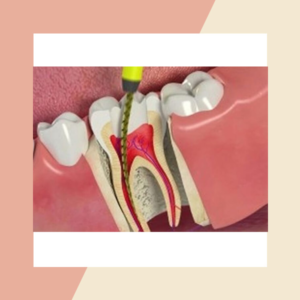Root Canal Treatments

What is Root Canal Treatment?
A root canal is an endodontic treatment that is performed inside your tooth. It involves removing the infected or damaged pulp (the soft tissue inside the tooth) and cleaning and sealing the root canals.
A root canal specialist usually performs this procedure to treat a tooth that is badly decayed, infected, or injured, and to save the tooth from extraction. The root canal procedure typically involves several steps and is performed under local anesthesia to minimize discomfort.
Why Do You Need a Root Canal?
When tooth decay takes charge of your tooth and starts spreading rapidly to the roots, affecting the tooth pulp, a root canal is performed. Removing tooth decay is essential, as it can cause severe infection and health problems.
The doctor, at firsts, analyzes the patient’s condition and then decides if they are the right candidate for root canal therapy or not.
The Benefits
Let’s find out how can a root canal treatment benefit you:
- Pain relief: The procedure can relieve the pain caused by an infected or inflamed tooth pulp.
- Preservation of the natural tooth: The treatment allows you to keep your natural tooth, which is often a better option than having it extracted.
- Improved dental health: Removing the infected pulp helps to prevent the spread of infection to other teeth and reduces the risk of further dental problems.
- Restores tooth function: After the procedure, the tooth is restored to full function, allowing you to chew and bite normally.
- Aesthetic benefits: The treated tooth can be restored with a dental crown or filling, which can improve the appearance of your smile.
The Procedure
Pretreatment Examination
Your dentist will take a radiograph of your tooth to examine the condition. Once, this step is done, your dentist will give you an anesthetic shot.
After that, a dental dam (a small shield made from vinyl and rubber) is placed on the spot of treatment to prevent saliva from entering the space. This will help your dentist to perform the therapy cleanly.
Let the treatment begin!
These are the root canal steps your dentist will be performing.
Drill the Teeth
Firstly, your dentist will drill your teeth until the pulp chamber is visible.
Remove the Dead Pulp
They will remove the decay or dead pulp from the tooth and clean it entirely.
Clean and Disinfect the Tooth
After the removal of both the pulp and the surrounding nerves, it’s time to sterilize it with disinfectant solutions.
Reshape Tooth
In this step, your dentist will shape them for the filling.
Filling
Finally, your dentist will fill the root with gutta-percha (a rubber-like decomposable material) with cement to adhere to the roots.
Sealing
Now, your dentist will put it to an end by temporarily filling the root canal filling.
Removing the Dental Dams
The next step would be removing the dental dams.
In special cases:
If the tooth is too weak to withhold root canal fillings, your dentist will place a metal or a plastic post to help retain the filling.
Post-treatment Steps
Congratulations, you have officially made it! After the treatment is completely performed, your dentist will prescribe some antibiotics to prevent the occurrence of infections.
Permanent Restoration of Tooth Structure
There is one major step that people tend to be careless with i.e. permanent restoration of tooth structure. This step ensures sealing the tooth completely. Your professional dentist will recommend the best type of restoration for you. If you miss this step, your root canal filling will be seized by bacteria again and you will need a root canal retreatment.
Root Canal Aftercare
- Avoid chewing on the treated tooth until the permanent filling or crown is in place.
- Maintain good oral hygiene by brushing and flossing regularly.
- Take any prescribed antibiotics or medications to deal with root canal pain as directed by your dentist.
- Attend any follow-up appointments with your dentist in Dallas, Tx to ensure proper healing and function of the treated tooth.
- Avoid hard or crunchy foods that could damage the tooth. It’s better to consult your doctor on what to eat after a root canal.
- Consider avoiding smoking or using tobacco products, as they can delay the healing process and increase the risk of complications.
- If you experience any pain, swelling, or signs of infection, contact your dentist right away.
- Following the aforementioned guidelines will ensure quick recovery from root canal therapy.
How Long Does A Root Canal Procedure Take?
After your dentist examines your oral health and suggests a root canal treatment, you might need only one or two dental visits to get it done.
Is Root Canals Safe?
Yes, the process is generally considered to be safe. In fact, it’s considered one of the most successful dental procedures with a success ratio of 86% to 98%.
To get your treatment and consultation from a reputable dentist in Dallas Tx, book your appointment now at Smile Lab Dallas.